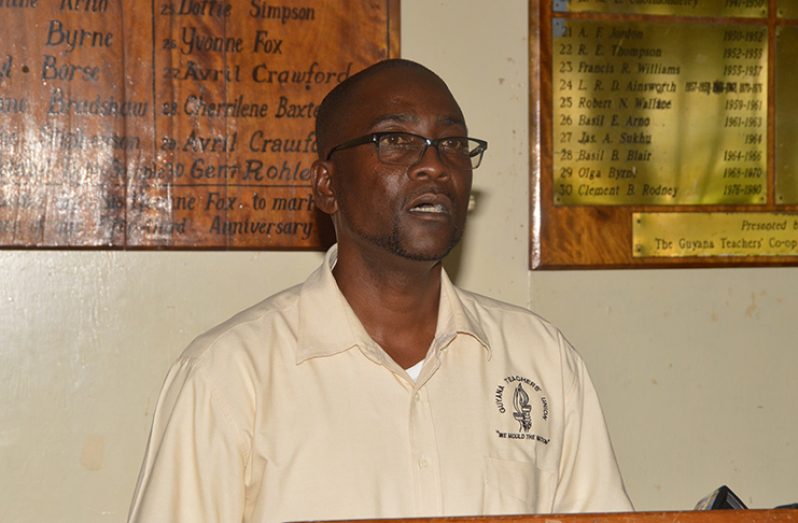– would have been ‘comfortable’ with 20% increase
THE Guyana Teachers Union will be looking to its Caribbean affiliates when it comes to finding a chairman and representative for the arbitration panel, which will overlook and settle its salary increase dispute with the Ministry of Education (MoE).
“It is very important for us to look for someone who will provide a neutral balance for both teachers and government. The chairperson being chosen, it is extremely critical that we have somebody that is going to bring balance; the challenge is finding someone who will not be politically influenced, someone that will bring that neutral balance to the team,” Lyte said at a press briefing Friday at GTU’s Woolford Avenue Headquarters.
“We have a few options; we have several affiliates from around the Caribbean that we could call upon to be part of the panel; it doesn’t exclude outside persons being included on the panel, so that might very well be an option going forward,” he added.
Lyte said that regardless of the outcome of the talks, both sides will have to adhere to the results of the arbitration process, even though the GTU would’ve actually been willing to accept a 20 per cent increase for 2016 had the government offered it.
Negotiations between the GTU and MoE ended in a deadlock after the former held out for a salary increase of 40 per cent for 2016, and incremental increases of five per cent for the years 2017, 2018, 2019 and 2020 to be granted to all categories of teachers and teacher educators.
Said Lyte Friday: “We would have been comfortable with 20 per cent; when we did our calculations, that would have been reasonable.
“But in negotiations, you can’t put forward exactly what you are requesting; and that’s a point missed by many persons across Guyana. In negotiations, you cannot start at a figure that you intend to get; you always have to find a way to negotiate downwards. So the Union could not have been aiming for 20 per cent and ask for 20 per cent in the front; it would have been broken down.”
In counter-proposing the GTU’s demand, the ministry had addressed Year 2018, offering a ballpark figure of $700M for salary increases, and $200M to address de-bunching.
Aside from salary, there were also several other financial and non-financial issues in the GTU’s proposal. Though the two sides were not able to agree on the major issues, they did come to a settlement on several other issues.
However, Lyte says when the arbitration panel reviews the issues between the MoE and GTU, even the issues already agreed upon may very well have to be readdressed.
“It behooves the committee also to address some of the matters that were already agreed on, because if you have a panel to look at the whole multi-year proposal, then they have to look at everything afresh. So it’s a fresh look at the proposal that was submitted by the Union,” Lyte said, adding:
“The dispute revolves around salary matters, and the outstanding debunching that is due to the Union since 2011; they’re all financial in nature, and those will be the major issues the panel will be dealing with. First of all, they will be looking at what percentage would be adequate for teachers to have a liveable wage, debunching, clothing allowance, risk allowance, several things proposed that are of a financial nature. Those are the ones that be on the front burner.”
It was last Thursday that the MoE and GTU agreed to move towards arbitration to settle the dispute, after the GTU refused to go through the conciliation stage of the process.
The arbitration process will be presided over by a panel comprising a mutually agreed upon chairman, a representative from the GTU and a representative from the MoE.
The outcome of the arbitration process will be final in settling the dispute between the two sides.




.jpg)










